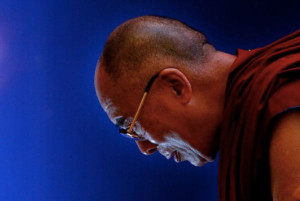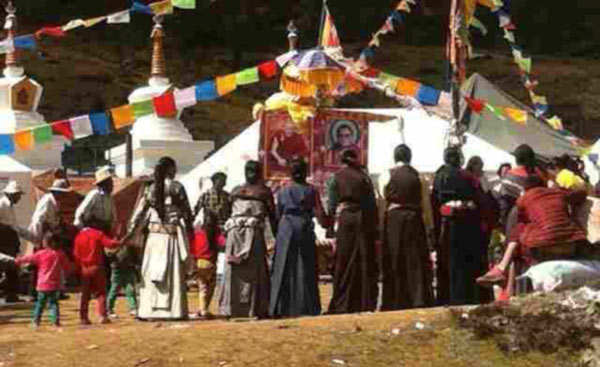Chinese Foreign Ministry spokesman repeats conditions for the Dalai Lama’s visit to China

His Holiness the Dalai Lama (Image: NYT)
Tibetans gather to pray for imprisoned Tibetan religious teacher

Local Tibetans gather to pray for Tenzin Deleg Rinpoche in his home area in Kham on October 12, 2014.
New images from Tibet depict a group of Tibetans in traditional dress holding hands in a circle around a picture of the Dalai Lama and Tenzin Delek Rinpoche in Nyagchuka county in Kardze Tibetan Autonomous Prefecture in Sichuan (the Tibetan area of Kham) on October 12, 2014.
Tibetan sources in exile said that at the ceremony, in the home area of Tenzin Delek Rinpoche: “Tibetans offered traditional white khatags (greeting scarves) on a stage during a ceremony and prayed for his return to the region from prison, to a large picture of Tenzin Delek Rinpoche and of a Lama that appears to be the Dalai Lama.” For more please see the full ICT report.
ICT: Increased militarization of the plateau as new aggressive “counter-terrorism” campaign expands from Xinjiang to Tibet
The Communist Party leadership is increasing its emphasis on the need of political control of Tibet and its central importance for the ‘stability’ of the whole of the People’s Republic of China. An important part of this policy has been the expansion of an aggressive ‘counter-terrorism’ drive to Tibet, as part of a larger effort taking place in Xinjiang and across China, which is resulting in an intensified militarization of the plateau.
As the Chinese authorities wage counter-insurgency without insurgents, and against citizens who peacefully express their views, there is an urgent need for re-evaluation of this dangerous and counter-productive approach. For more information please see the full report here.
CECC Report says increase in harsh security and punitive measures in Tibet
The Congressional-Executive Commission on China (CECC), in its annual report for 2014 (covering the period from fall 2013 to fall 2014) released on October 9, 2014, has said that in Tibetan areas there was an increase in harsh security and punitive measures. It also said Chinese government leaders showed no willingness to reexamine policies toward Tibetans that deny the cultural, religious, and linguistic rights or to engage in dialogue with representatives of the Dalai Lama.
In its recommendations to Members of the U.S. Congress and Administration officials, the CECC said they should urge “the Chinese government to resume contact with the Dalai Lama or his representatives and engage in dialogue without preconditions.” It added, “A Chinese government decision to engage in dialogue can result in a durable and mutually beneficial outcome for the government and Tibetans that will benefit local and regional security in coming decades.”
For more please see the full ICT report, which includes the findings and recommendations of the CECC.

